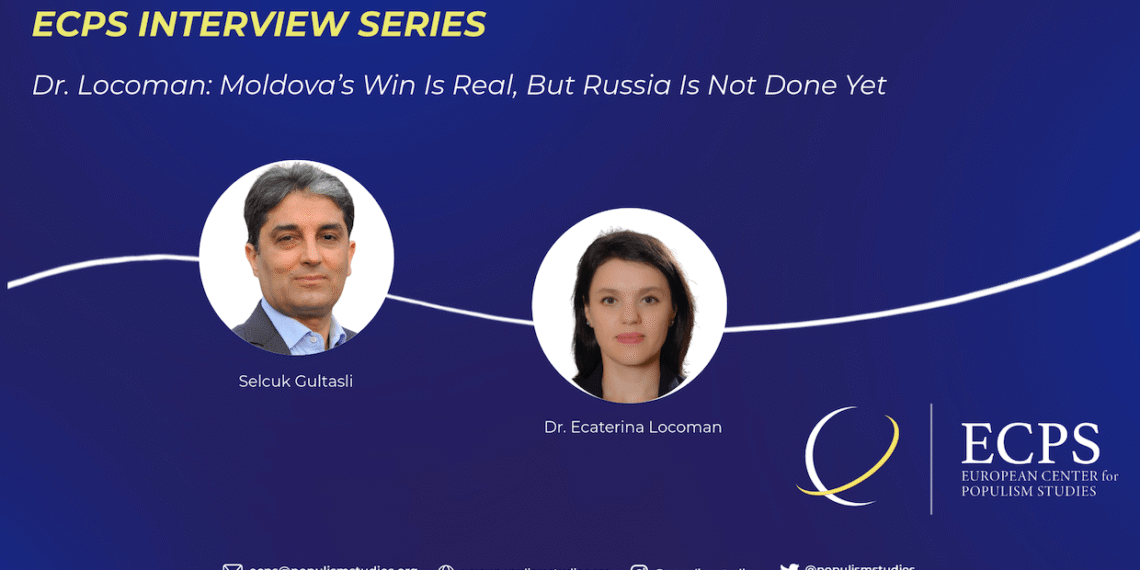Moldova’s 2025 parliamentary elections mark a pivotal moment in the geopolitical tug-of-war between the European Union and Russia. Despite unprecedented hybrid interference—including disinformation, illicit financing, and the use of new technologies—the pro-European Party of Action and Solidarity (PAS) secured a decisive victory. Dr. Ecaterina Locoman cautions, however, that this success is “more of a temporary setback” for Moscow than a strategic defeat: “Russia will gather its resources again.” In this interview with ECPS, Dr. Locoman analyzes Moldova’s evolving democratic resilience, the adaptive strategies of Russian influence, the role of the diaspora, and the country’s ambitious EU accession goal. She underscores the importance of sustained domestic reform and Western engagement to keep Moldova on its “irreversible European path.”
Interview by Selcuk Gultasli
Moldova’s 2025 parliamentary elections have emerged as a pivotal moment in the geopolitical contest between the European Union and Russia. Against a backdrop of unprecedented hybrid interference—including disinformation campaigns, illicit financing, and the use of new technologies—Moldova’s pro-European Party of Action and Solidarity (PAS) secured a decisive victory. Yet, as Dr. Ecaterina Locoman cautions in this interview with the European Center for Populism Studies (ECPS), this success must be understood as both real and fragile: “I expect that Russia will continue to influence domestic politics. It’s part of their strategic goal to regain control over the post-Soviet region, and I don’t think this should be read as a strategic loss. It’s more of a temporary setback, but they will gather their resources again.”
Dr. Locoman, Senior Lecturer at the Lauder Institute and in the Department of Political Science at the University of Pennsylvania, situates Moldova’s electoral resilience within a hybrid framework of domestic determination and external support. “We can interpret the results of the Moldovan elections as a hybrid outcome. On the one hand, they reflect a strong domestic effort—both from political institutions and voters—who showed remarkable resilience in the face of Russian interference and influence. On the other hand, it is also clear that without the support of Western partners, especially the European Union, this success would not have been possible. So, it’s both a domestic and international story.”
This resilience was manifested not only through institutional preparedness—such as stronger oversight of illicit financing and disinformation—but also through robust diaspora engagement and sustained voter mobilization. “The numbers show that 280,000 Moldovans abroad voted in the elections,” Dr. Locoman notes, highlighting how mail ballots and close transnational ties helped bolster the pro-EU vote. She underscores that “the diaspora is relatively young… they maintain very strong links to Moldovan politics and what is happening at home.”
At the same time, Moscow’s influence tactics are evolving. Russia experimented with “the use of AI and alternative financial methods, like cryptocurrency,” to obscure financial flows and spread propaganda. While these efforts ultimately proved less effective this cycle, Dr. Locoman warns against complacency: “Moscow is one of the best students of the post-Soviet region… they will learn from their own mistakes and improve their strategies in the next elections. This fight needs to continue.”
Looking ahead, Moldova’s ambition to join the European Union by 2030 faces both internal and external hurdles. Domestically, slow reforms, corruption, and economic vulnerabilities remain pressing concerns. Externally, geopolitical vetoes—most notably from Hungary—could obstruct accession negotiations. “I have some doubts—not fear, but doubts—about how quickly the situation can move by 2030,” Dr. Locoman admits. Yet she also maintains a note of cautious optimism: “Up until 2022, Moldova had been knocking on the EU’s doors for more than 30 years… and then, in the end, it happened.”
In this interview, Dr. Locoman offers a nuanced analysis of Moldova’s evolving democratic landscape, the adaptive strategies of Russian influence, and the strategic choices facing both Moldovan and European leaders in the years to come.


